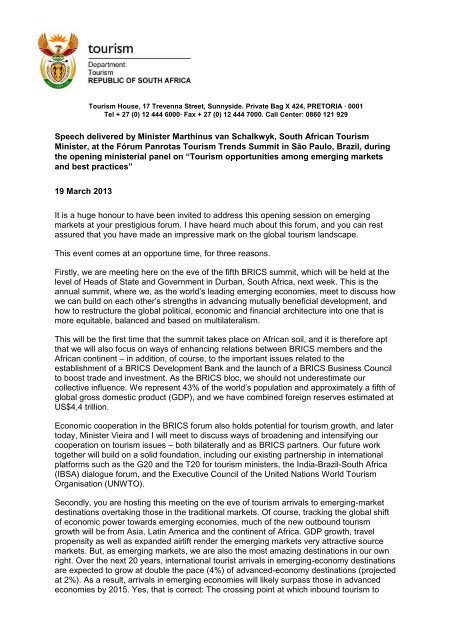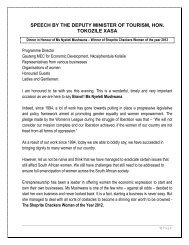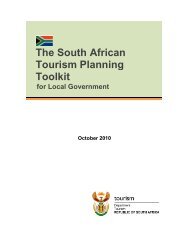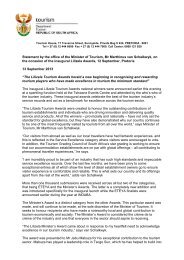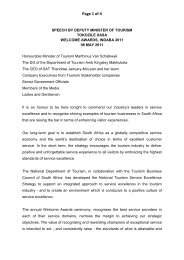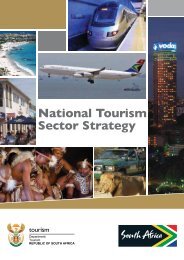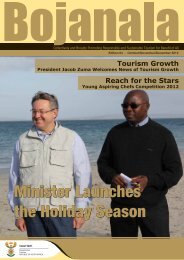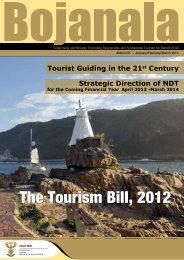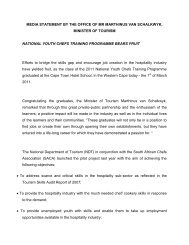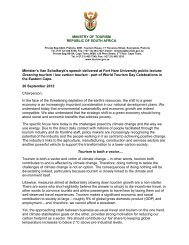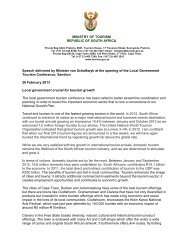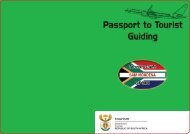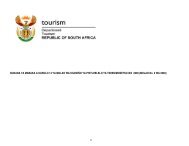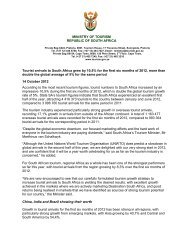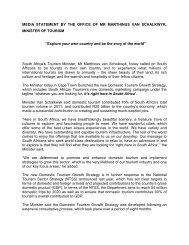Speech delivered by Minister van Schalkwyk, South African Tourism ...
Speech delivered by Minister van Schalkwyk, South African Tourism ...
Speech delivered by Minister van Schalkwyk, South African Tourism ...
Create successful ePaper yourself
Turn your PDF publications into a flip-book with our unique Google optimized e-Paper software.
<strong>Tourism</strong> House, 17 Trevenna Street, Sunnyside. Private Bag X 424, PRETORIA ∙ 0001<br />
Tel + 27 (0) 12 444 6000∙ Fax + 27 (0) 12 444 7000. Call Center: 0860 121 929<br />
<strong>Speech</strong> <strong>delivered</strong> <strong>by</strong> <strong>Minister</strong> Marthinus <strong>van</strong> <strong>Schalkwyk</strong>, <strong>South</strong> <strong>African</strong> <strong>Tourism</strong><br />
<strong>Minister</strong>, at the Fórum Panrotas <strong>Tourism</strong> Trends Summit in São Paulo, Brazil, during<br />
the opening ministerial panel on “<strong>Tourism</strong> opportunities among emerging markets<br />
and best practices”<br />
19 March 2013<br />
It is a huge honour to have been invited to address this opening session on emerging<br />
markets at your prestigious forum. I have heard much about this forum, and you can rest<br />
assured that you have made an impressive mark on the global tourism landscape.<br />
This event comes at an opportune time, for three reasons.<br />
Firstly, we are meeting here on the eve of the fifth BRICS summit, which will be held at the<br />
level of Heads of State and Government in Durban, <strong>South</strong> Africa, next week. This is the<br />
annual summit, where we, as the world’s leading emerging economies, meet to discuss how<br />
we can build on each other’s strengths in ad<strong>van</strong>cing mutually beneficial development, and<br />
how to restructure the global political, economic and financial architecture into one that is<br />
more equitable, balanced and based on multilateralism.<br />
This will be the first time that the summit takes place on <strong>African</strong> soil, and it is therefore apt<br />
that we will also focus on ways of enhancing relations between BRICS members and the<br />
<strong>African</strong> continent – in addition, of course, to the important issues related to the<br />
establishment of a BRICS Development Bank and the launch of a BRICS Business Council<br />
to boost trade and investment. As the BRICS bloc, we should not underestimate our<br />
collective influence. We represent 43% of the world’s population and approximately a fifth of<br />
global gross domestic product (GDP), and we have combined foreign reserves estimated at<br />
US$4,4 trillion.<br />
Economic cooperation in the BRICS forum also holds potential for tourism growth, and later<br />
today, <strong>Minister</strong> Vieira and I will meet to discuss ways of broadening and intensifying our<br />
cooperation on tourism issues – both bilaterally and as BRICS partners. Our future work<br />
together will build on a solid foundation, including our existing partnership in international<br />
platforms such as the G20 and the T20 for tourism ministers, the India-Brazil-<strong>South</strong> Africa<br />
(IBSA) dialogue forum, and the Executive Council of the United Nations World <strong>Tourism</strong><br />
Organisation (UNWTO).<br />
Secondly, you are hosting this meeting on the eve of tourism arrivals to emerging-market<br />
destinations overtaking those in the traditional markets. Of course, tracking the global shift<br />
of economic power towards emerging economies, much of the new outbound tourism<br />
growth will be from Asia, Latin America and the continent of Africa. GDP growth, travel<br />
propensity as well as expanded airlift render the emerging markets very attractive source<br />
markets. But, as emerging markets, we are also the most amazing destinations in our own<br />
right. Over the next 20 years, international tourist arrivals in emerging-economy destinations<br />
are expected to grow at double the pace (4%) of ad<strong>van</strong>ced-economy destinations (projected<br />
at 2%). As a result, arrivals in emerging economies will likely surpass those in ad<strong>van</strong>ced<br />
economies <strong>by</strong> 2015. Yes, that is correct: The crossing point at which inbound tourism to
2<br />
emerging-market destinations will exceed those to the ad<strong>van</strong>ced economies is 2015, a mere<br />
two years from now. We, as emerging markets, are thus on the verge of becoming the<br />
centre of the tourism universe.<br />
Let me turn to the third reason why I am particularly excited about sharing this platform with<br />
you today. It fills us, as <strong>South</strong> <strong>African</strong>s and outgoing hosts of the FIFA World Cup, with so<br />
much pride to celebrate with you your major achievement in securing the hosting of this<br />
mega-event.<br />
In <strong>South</strong> Africa, we always underscored that our hosting of the event was not an end goal in<br />
itself, but only a milestone on our broader journey to develop tourism as a competitive<br />
industry that creates a better life for all our people. In 2010, we witnessed an additional 300<br />
000 tourists arriving in <strong>South</strong> Africa for the primary purpose of attending the World Cup. In<br />
terms of spend, this added a R3,6 billion boost to our economy. But, of course, the World<br />
Cup was about so much more than that. It brought massive brand exposure and positivity to<br />
our destination; it stimulated local economic development and community upliftment; it<br />
united our nation as brand ambassadors and excellent hosts; it grew the skills base, and it<br />
led to public and private infrastructure investments that would not have formed part of<br />
business-as-usual planning, such as those in airports, roads, tourist attractions and hotels –<br />
all with the capacity to carry future tourism growth.<br />
When we bid to host the 2010 FIFA World Cup, our bid represented the hopes of a nation.<br />
We had dreamt of hosting the largest sporting event in the world in order to showcase our<br />
wonderful country, its people, our capabilities and our vision for the future. We worked<br />
tirelessly for many years across all sectors – government, the private sector and citizens.<br />
And we planned, invested and implemented our vision in the face of many challenges, fierce<br />
scepticism, and sometimes even outright disbelief that we could deliver on our<br />
commitments. Today, the success of the event still reverberates throughout our country, and<br />
especially our tourism economy. Last year, we once again registered 10%-plus year-on-year<br />
growth in our international tourist arrivals, more than double the global average for 2012.<br />
Chair, you have asked me to share some lessons from our hosting of the World Cup. Let<br />
me mention just a handful.<br />
Firstly, never allow the sceptics to get to you. Need I say more You have well-considered<br />
plans; you understand best how this mega-event will act as a catalyst for the development of<br />
your destination and its branding. So, for now, it is about keeping your eye on that ball, and<br />
not allowing detractors to shift the focus.<br />
Secondly, adopt a ‘milestone’ mind-set rather than an ‘end goal’ mind-set. It can never be<br />
about hosting a tournament alone. It is about leveraging the legacy of infrastructure<br />
development, skills development, nation building and brand awareness as an upstream<br />
reservoir for future growth. Ultimately, it is about a long-term journey to develop and grow<br />
tourism as part of your national development plan.<br />
Thirdly, carefully nurture your value proposition. In <strong>South</strong> Africa, a small pocket of<br />
accommodation establishments briefly experimented with pricing themselves out of the<br />
market in the run-up to the World Cup. But it was to their detriment. Ultimately, when<br />
tourists visit your shores for the World Cup, they want to experience the same value for<br />
money that you offer at all other times; otherwise, you dilute rather than build your brand<br />
equity. Hand in hand with this, the private sector in particular must also avoid over-investing<br />
in the building of new accommodation at the upper end of the market, especially if that could<br />
lead to a demand-and-supply mismatch afterwards.<br />
Fourthly, in this age of social media and cable network television broadcasts, you will have a<br />
magnifying glass over your every move for four weeks or more. The cumulative number of<br />
viewers for the World Cup in <strong>South</strong> Africa was 32 billion. This presents a massive
opportunity to sell the best you have to offer to the rest of the world, but it also means you<br />
have to carefully manage your reputation, with a media that thirsts for new information<br />
around the clock. Arranging pre-event trips to expose the media to tourist and other areas<br />
for coverage off the football field thus has an important place in any media relations<br />
strategy.<br />
3<br />
In the fifth instance, local community support throughout the life cycle of the event is<br />
critically important. Worldwide, we know that the most successful mega-events are those<br />
aligned with the needs and well-being of communities, and in which communities were<br />
actively involved, from planning to delivery. Ultimately, communities will host tourists, will<br />
impress them and will convince them to return. For us, a major objective was to ad<strong>van</strong>ce<br />
social inclusion <strong>by</strong> also strengthening opportunities for small businesses, which form the<br />
backbone of the tourism sector, and to invest significantly in skills development and training.<br />
Finally – and as the recent hosts of the Rio+20 Earth Summit, you understand this better<br />
than anyone of us – the environment and green legacy forms an increasingly important part<br />
of mega-event execution. Besides managing the carbon, water and waste footprint of the<br />
World Cup, this mega-event also presents a unique opportunity to educate households<br />
about the benefits of sustainable and low-carbon lifestyles.<br />
With these few words, allow me once again to congratulate you on this wonderful<br />
achievement. I trust this tournament will further cement Brazil’s position as an attractive<br />
investment market and a tourist destination that can compete with the best in the world. It is<br />
not about 30 days of football; it is about building a country and uniting its peoples; about an<br />
emerging economy coming of age and building a stronger nation.<br />
Thank you.<br />
Melene Rossouw<br />
Telephone: + 27 (0) 82 753 7107<br />
Email mrossouw@tourism.gov.za<br />
Natasha Rockman<br />
Telephone: + 27 (0) 76 429 2264<br />
Email: nrockman@tourism.gov.za<br />
Issued <strong>by</strong> Ministry of <strong>Tourism</strong>


